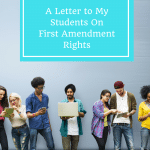The First Amendment to the U.S. Constitution guarantees many freedoms. It guarantees the right to publish news (freedom of press), the right to practice or not practice a religion (freedom of religion), the right to request a course of action from the government (freedom of petition), and the right to gather to express your views in a non-violent way (freedom of assembly). The First Amendment also guarantees the freedom of speech.
The protections of the freedom of speech are often misunderstood by those who do not recognize its reach. I had a student who once told me that he did not have to stop talking in class because he was exercising his First Amendment right to free speech. Well . . . not quite! Like any right guaranteed in the Constitution, the First Amendment right to free speech is not absolute. It has some restrictions that may require a curtailment of a citizen’s speech.
The first limit of freedom of speech is that it does not apply to all types of employees. The First Amendment states that “Congress shall make no law . . . abridging the freedom of speech . . . .” Therefore, the Constitution provides explicit protection for government employees only, which obviously includes teachers.
So, does that mean that teachers can say whatever they want and claim the protections of the First Amendment? The answer should be a resounding no. The fear of termination based on speech and expression has caused many teachers to take great lengths in hiding their online social networking sites and writing education articles under a pseudonym. Teachers and school employees are obviously aware that the First Amendment has some boundaries.
In Garcetti v. Ceballos, 547 U.S. 410 (2006), the Supreme Court outlined a two-prong test to determine whether a public employee engaged in constitutionally protected speech. First, the court will determine whether the employee spoke as a citizen on a matter of public concern. This question analyzes whether the employee spoke as a citizen or pursuant to official job duties. If the employee did not speak as a citizen on a matter of public concern, then the employee is not entitled to the protections of the First Amendment. Second, the court will determine whether the government body had an adequate reason for treating the public employee differently from any other member of the general public. This question analyzes whether the employee’s speech was outweighed by the state’s interest in promoting efficiency.
Imagine the following case:
A state statute requires that history courses infuse more African and African-American history into the curriculum. A history teacher in that state believes that a local school district is failing to require other history teachers to infuse African and African-American history into the curriculum. Thus, the history teacher voices his concerns at various school board meetings. Subsequent to his speeches at the board meetings, the teacher was transferred many times to different schools and eventually terminated. He believed that he was terminated because of his critic of the district’s implementation of the state statute.
The previous scenario is based on Sherrod v. School Board of Palm Beach County, 703 F. Supp.2d 1279 (S.D. Fla. 2010).
In this case, the court ruled that Mr. Sherrod (the history teacher) was speaking as a citizen on a matter of public concern at the board meetings. His official job duties did not include curriculum development or ensuring that the district complied with the state statute. Furthermore, the court ruled that Mr. Sherrod’s speech outweighed the government’s interest in efficiency. Mr. Sherrod presented his concerns a public board meeting. His concerns did not affect the harmony at the schools where he worked. In addition, he was the father of two children in the school district; therefore, he was also speaking as a concerned parent.
The following factors will help teachers understand whether their speech is constitutionally protected:
(1) The speech touches on a matter of public concern. (This is a requirement. If the speech does not touch on a matter of public concern, then the speech is not protected.)
(2) The teacher’s speech outweighs the school district’s interest in efficiency. The courts may consider such factors as:
– Whether the speech affects the harmony of the staff
– Whether the speech has a detrimental impact on working relationships
– Whether the speech interferes with the normal operation of the employer’s business.
Public school teachers are in a unique position. They are individuals and employees of the state. Therefore, school districts have an interest in making sure that the messages that students receive are in line with the district’s goals and vision.
Editor’s Note: If you enjoyed this article, please become a Patreon supporter by clicking here.








What if the district's goals and vision have come under control of entities openly and willingly criticizing the job the district and its teachers are doing?
As with many things in the law, whether the teacher's speech is protected by the First Amendment depends on the unique circumstances of each case. For example, if the teacher is speaking about their dislike of a principal, a court will likely deem this as unprotected under the First Amendment because it does not speak to a matter of public concern. If, for example, a teacher is speaking out about the need to engage in more rigorous instruction in math, a court may deem this protected speech because it touches on a matter of public concern and the teacher's speech may outweigh the district's interest in efficiency.
What if a teacher makes a comment on her private and personal FB page about the presidential election? She says something like Trump won because he doesn’t give a hoot about safe spaces and gender neutral bathrooms? She was accused of using inflammatory language and terminated.
Hi Sarah,
If the teachers page was linked with the school’s webpage, even by saying they work at “school name” or “school district” then their Facebook page is seen as representing the viewpoints of that school or district. If that was the case, the school and district have every right to terminate this teacher, even if they have tenure.
This is also my concern.. What if a teachers speaks for more democratic norms , like local body elections etc..
Under a “Anti Harrassment Policy”, if a student found the teachers teachings offensive to him/her, would this lesson or teaching be abolished? (If this were to take place on a public college or university campus)
What if the teacher wrote a book critiquing the common core, professional development, and certain teacher evaluation rubrics? What if in that book the teacher referred to things that happened to him at work but didn’t use any names?
In the 9th Circuit, there is a limited exception for teachers.
We hold that academic employee speech not covered by Garcetti is protected under the First Amendment, using the analysis established in Pickering. The Pickering test has two parts. First, the employee must show that his or her speech addressed “matters of public concern.” Pickering, 391 U.S. at 568, 88 S.Ct. 1731; see Connick, 461 U.S. at 146, 103 S.Ct. 1684. Second, the employee’s interest “in commenting upon matters of public concern” must outweigh “the interest of the State, as an employer, in promoting the efficiency of the public services it performs through its employees.”
Demers v. Austin, 746 F.3d 402, 412 (9th Cir. 2014)
What if a teacher is saying that it is amoral and against Gods plan to be homosexual.
What if a teacher has said in class that abortion is wrong under any circumstance and he would make his wife have that baby.
Neither of these teachers are health teachers.
What if a teacher is quietly reading his bible on his desk during quiet reading time. His students are reading quietly and he chooses to do his own reading during this time. Does he have the right as per the First Amendment?